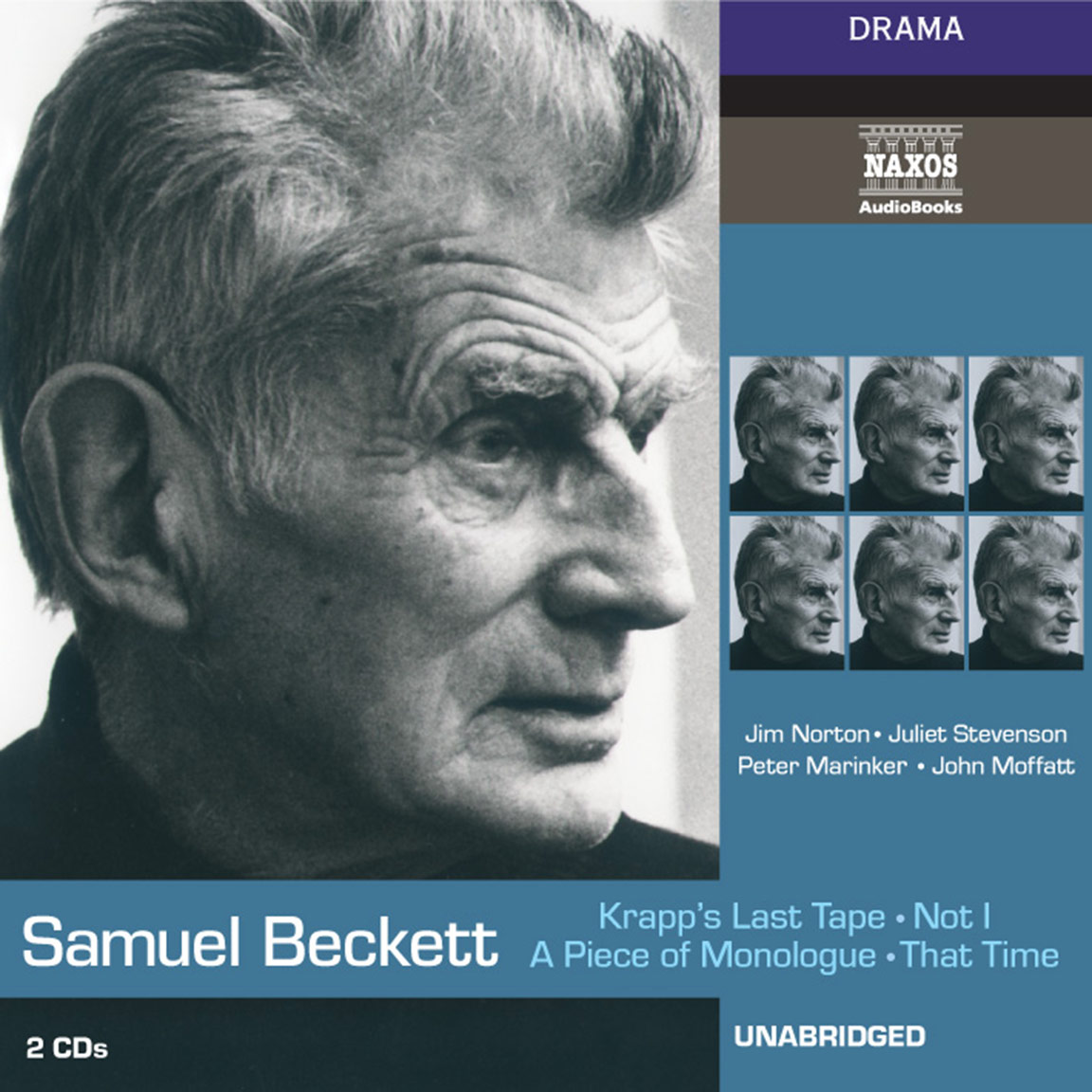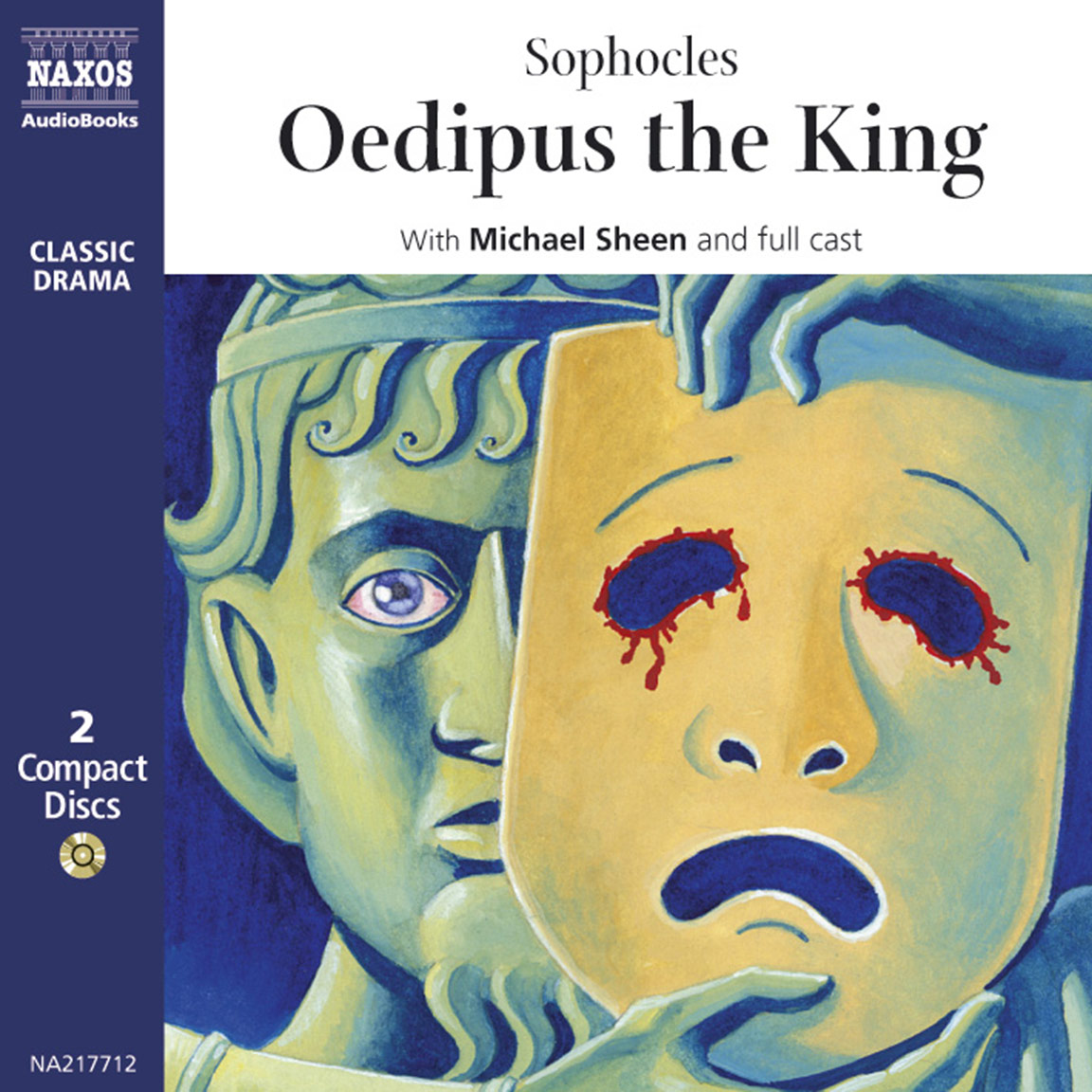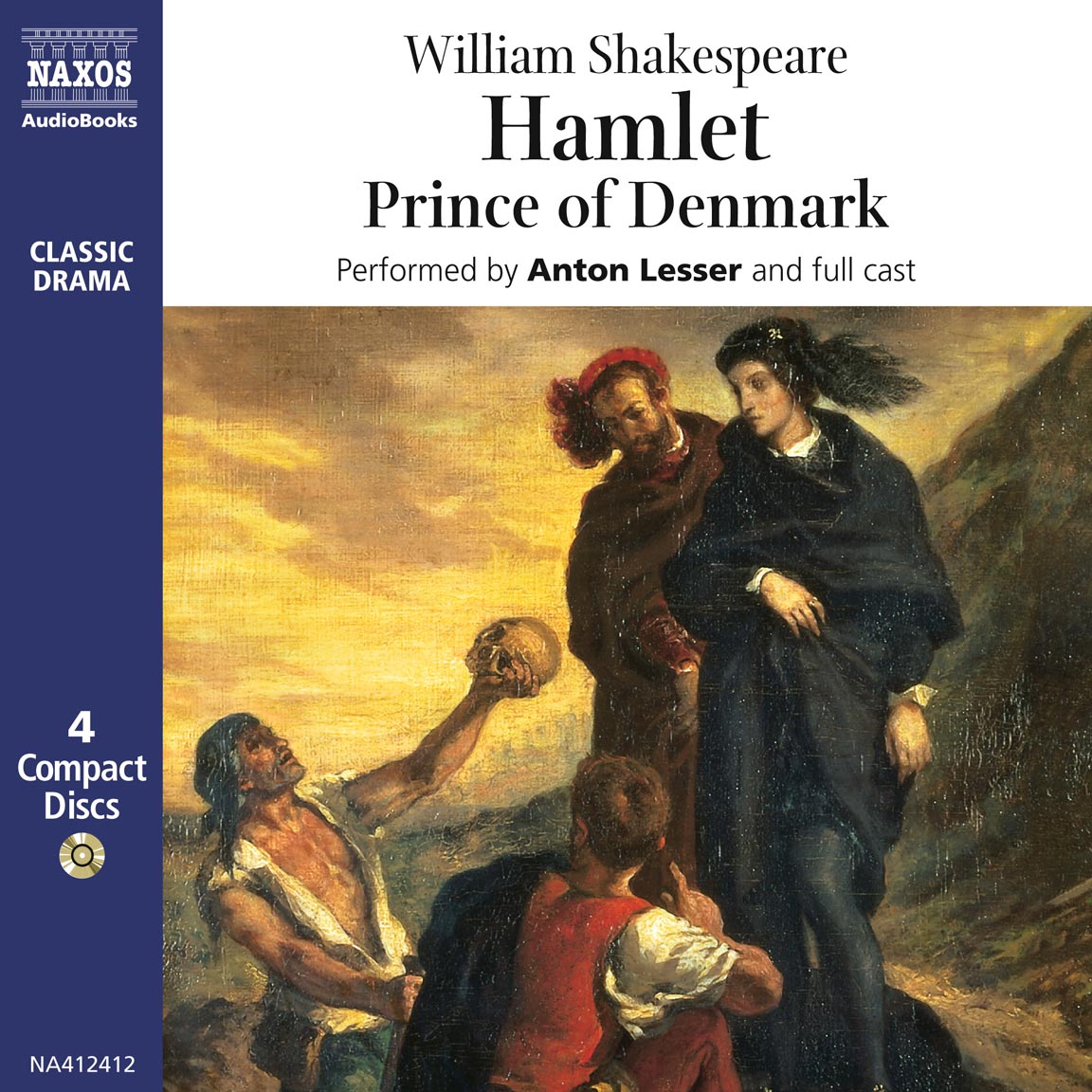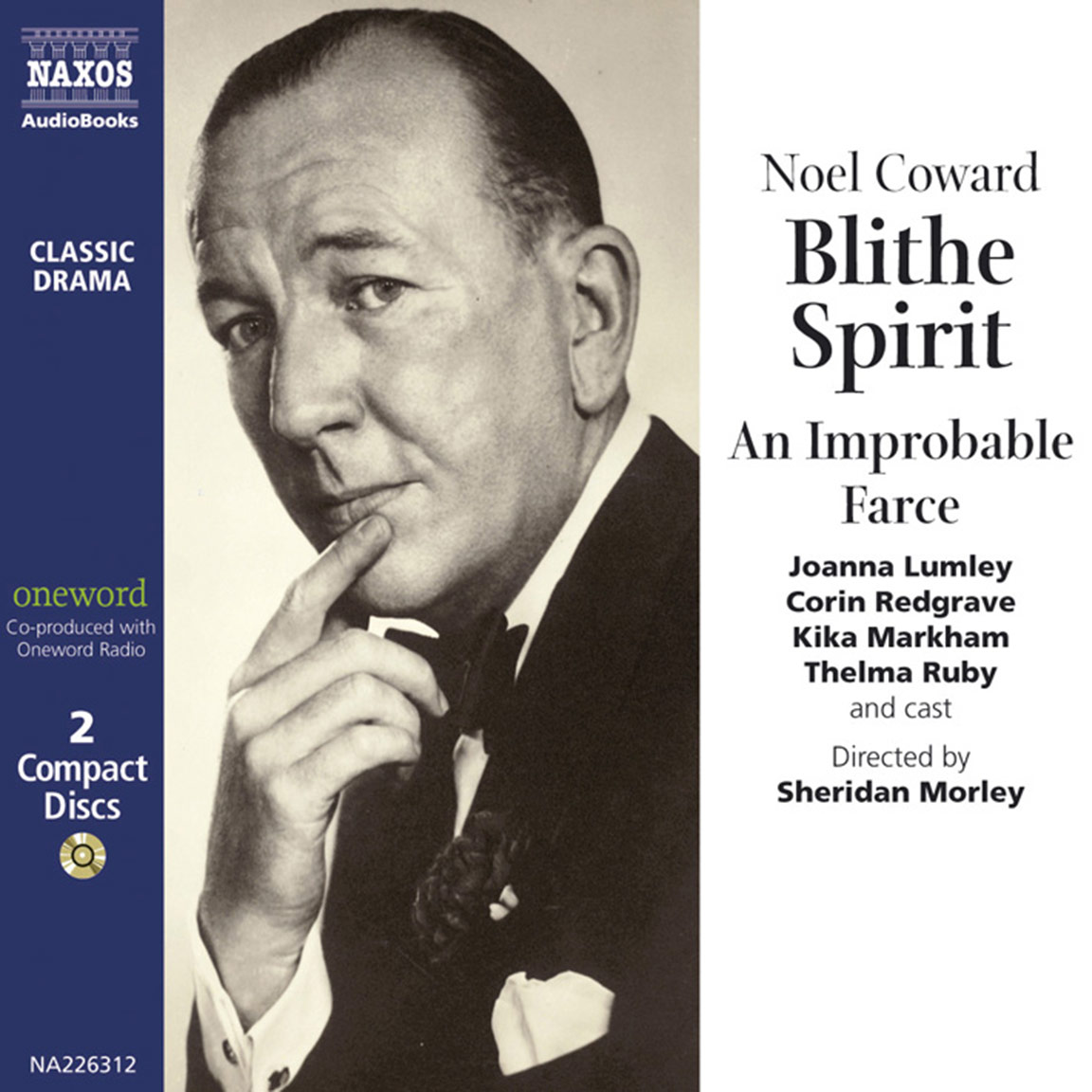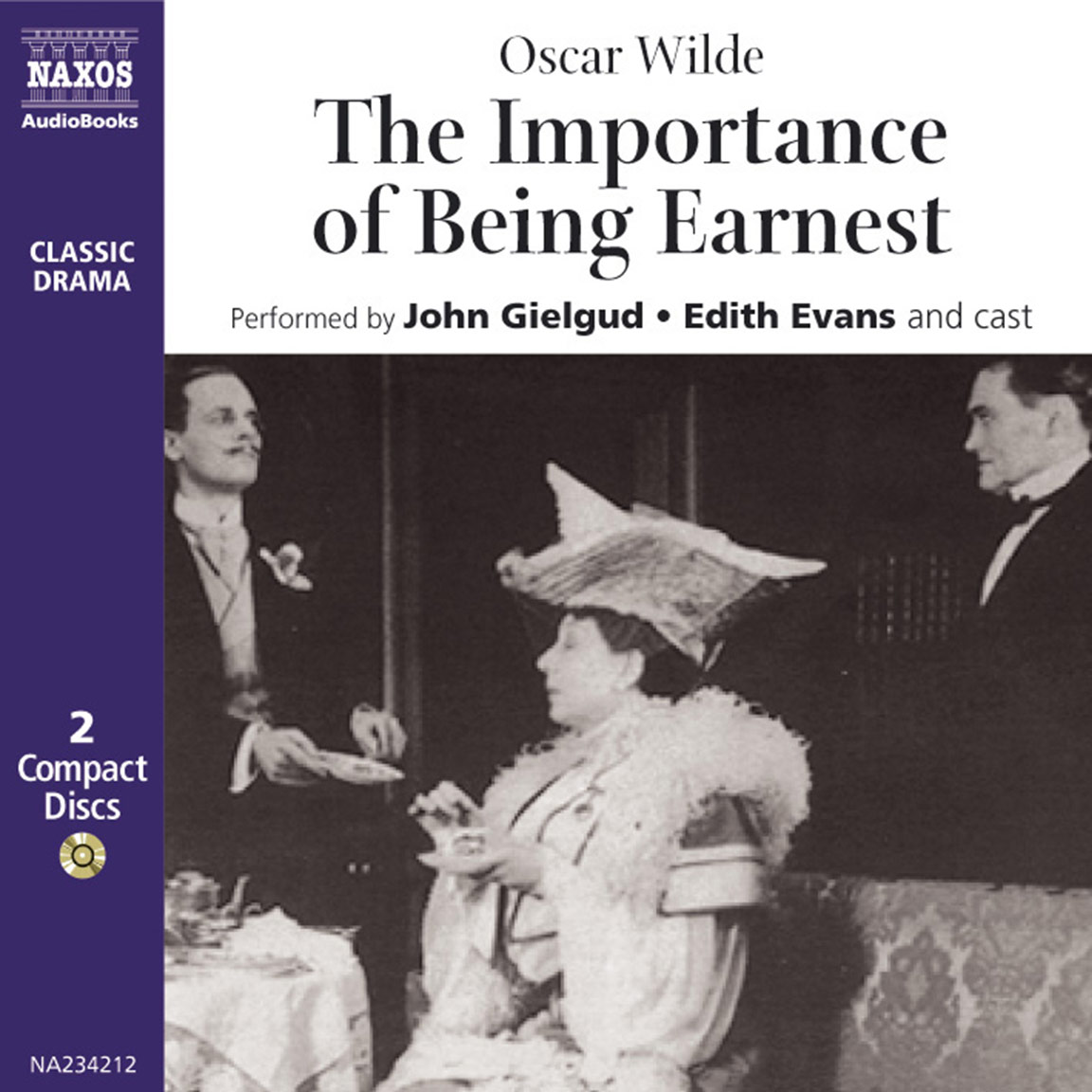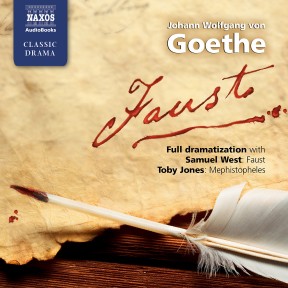
Audio Sample
Johann Wolfgang von Goethe
Faust
Performed by Samuel West, Toby Jones, Anna Maxwell Martin, Stephen Critchlow, Derek Jacobi & Daniel Mair
abridged
Faust is one of the pillars of Western literature. This classic drama presents the story of the scholar Faust, tempted into a contract with the Devil in return for a life of sensuality and power. Enjoyment rules until Faust’s emotions are stirred by a meeting with Gretchen, and the tragic outcome brings Part 1 to an end. Part 2, written much later in Goethe’s life, places his eponymous hero in a variety of unexpected circumstances, causing him to reflect on humanity and its attitudes to life and death.

-
Running Time: 4 h 0 m
More product details
Digital ISBN: 978-1-84379-550-6 Cat. no.: NA0068 Download size: 114 MB Produced by: Nicolas Soames Directed by: David Timson Edited by: Norman Goodman Translated by: John R. Williams BISAC: DRA004020 Released: October 2011 -
Listen to this title at Audible.com↗Buy on CD at Downpour.com↗Listen to this title at the Naxos Spoken Word Library↗
Due to copyright, this title is not currently available in your region.
You May Also Enjoy
Cast
- Samuel West
- Faust
- Toby Jones
- Mephistopheles
- Anna Maxwell Martin
- Margareta
- Stephen Critchlow
- Wagner
- Derek Jacobi
- The Lord
- Daniel Mair
- Euphorion
- Gunnar Cauthery
- Raphael/Male Monkey/Will O’The Wisp (Pt 1) Emperor/2 Knight/Chiron/Proteus/Angel (Pt 2)
- Peter Kenny
- Gabriel/Valentin (Pt 1) Herald/Steward/Poet/Dryad/Lynceus/Angel (Pt 2)
- Sean Barrett
- Michael/Spirit Of The Earth/Old Peasant (Pt 1) Nobleman/Commander/Courtier/ Famulus/Thales./Angel (Pt 2)
- Gerard Horan
- 2 Nobleman/Treasurer/Diplomat/ Gryphon/Nereus
- Anne-Marie Piazza
- Female Monkey/Lieschen/Pedlar-Witch (Sc.18)/ Young Witch (Sc.18 ) (Pt 1) 1 & 4 Lady/Homunculus/Lamiae1/Phorkyad1/ Greek Chorus/Want./Angel (Pt 2)
- Joannah Tincey
- Martha/Witch (Sc.5)/Witch (Sc.18) (Pt 1) 2 & 5 Lady/1 Sphinx/Lamiae 2/Phorkyad 2/ Greek Chorus/Debt./Angel (Pt 2)
- Auriol Smith
- 3 & 6 Lady/2 Sphinx/Manto/Lamiae 3/Phorkyad 3/ Panthalis/Need/Mater Gloriosa. (Pt 2)
- Hugh Dickson
- Chancellor/Astrologer/1 Knight/ Anaxagoras (Pt 2)
- Emily Raymond
- Helen/Care/Angel (Pt 2)
Reviews
Winner of AudioFile Earphones Award
If it’s been a while since you tackled Goethe’s Faust – like, forever – don’t wait a moment longer. John R. Williams’s sparkling English translation is delightful, full of wit and delicious rhymes, and would be reason enough to fling yourself at it, but this full-cast production more than doubles the pleasure. The actors play it as if we were all Faust and hell were going to be a lot worse than other people. The performances are marvellous, and the sound effects clever and often gorgeous (the choir!). After this rendering of ’Walpurgisnacht,’ you’ll never see Hallowe’en the same again. One might call this Harry Potter for grown-ups, except that the good guys – well, I wouldn’t want to give away the ending. What a great theatrical experience.
B.G., AudioFile
Goethe’s classic tragedy is here vividly enacted by a talented cast, including Samuel West (Faust), Toby Jones (Mephistopheles) and Derek Jacobi (The Lord). Frustrated with the limitations of mankind, Faust is given the ultimate offer by the Devil incarnate and must live with the consequences of accepting such a bargain. Despite the abridgement, the production is well contained, clear, and nicely executed.
Verdict: The performances all shine, with the only faltering owing to the sound mixing. At times, the music and limited sound effects interfere with one’s ability to hear the cast clearly, especially given the word patterns of the rhyming schemes. Recommended for fans of dramatisations, classics and plays.
Lance Eaton, Library Journal
Booklet Notes
Though Goethe’s Faust is considered internationally to be his greatest work, there have been relatively few performances in English since its publication in 1832, and its literary eminence in Great Britain has been maintained by reputation rather than theatrical experience. The problem has partly been its translation into English; all translations date, and none more so than those of verse drama. After a time, the accepted style of one era renders the words unperformable in another, and actors struggle to make them sound believable.
Therefore, when the BBC commiss-ioned me to direct and adapt a production of Faust for Radio 3, my first consideration was to find a translation that actors could bring to life in the 21st century, without compromising Goethe’s original. I first looked at Louis MacNeice’s translation, a ground-breaking BBC broadcast in the 1940s, but sadly suffering now from MacNeice’s own poetic intervention. It sounds florid and false, even though it was still an improvement on many others I read. The version completed by John R. Williams in 2000, however, proved to be lean, colloquial and contemporary without destroying the integrity of Goethe’s verse. Above all, it is actor-friendly.
My second consideration was the adaptation. Goethe spent 60 years on his masterpiece, beginning in the 1770s when he was in his 20s, and continuing to tinker with it in his 80s, in the months before his death in 1832. The result is a sprawling epic that touches on all aspects of the human condition as Goethe perceived them throughout his long life. It was a vision evolving from the Age of Enlightenment to the Romantic era.
If performed in their entirety, both parts of Faust would last more than ten hours, and the BBC required a version lasting no more than four hours. Of necessity, therefore, much had to go: scenes of topical or purely literary interest were cut, and my criterion was to maintain, as far as possible, a narrative thread throughout.
It is a distinctly un-Christian salvation, despite Goethe creating a heaven and a ‘Lord’ that are recognisably Christian in structure
Faust is a piece that shows us the workings and development of a great artist’s mind. Many of Goethe’s ideas have a resonance for our time as well as his, not least of which his views on man’s relationship to his environment and nature. Throughout, the drama is vividly imagined, and any production must rise to Goethe’s level of infinite and varied expression.
By the time he completed Faust, Goethe had ceased to believe it could be performed on the stage, and was writing purely for the reader’s imagination – the theatre of the mind. This could be a definition of radio drama itself, and with the aid of atmospheric choral and vocal music sensitively composed by Roger Marsh, and a soundscape brilliantly conceived by Norman Goodman, I hope this interpretation will take a great literary work off the library shelf and bring it to life for the 21st century.
PART 1
Goethe took the 15th century German legend of Faust, which in its folk version is a simple tale of good versus evil, and added ingredients that were uniquely his own. He introduced a love interest in the character of a young girl, Gretchen, and the characterisation of the devil Mephistopheles, who is at times presented as a grossly comic and cynical commentator on the human condition. To an age that exalted rational thinking, the Gretchen love story, showing the tragic fate of the innocent heroine, illustrated the destructive power of our earthly desires when not controlled by reason. In the 1770s, this modern theme of the spoiling of simplicity appealed greatly to the young Goethe, recalling many folk-tales and songs from earlier times, with heroines like Gretchen.
However, the Gretchen section, which is presented as a domestic tragedy, distracts Goethe from his main theme: the pact between Faust and Mephistopheles and its consequences. Goethe instead develops a terse and sharp relationship between the two. Mephistopheles is eternally cynical and destructive in character, Faust increasingly idealistic and optimistic; it is their verbal fencing that, if anything, gives a unity to both parts of Faust. Mephistopheles is a cynic, a cosmic mocker, a ‘spirit of denial’ who becomes a catalyst to rouse Faust to action. In the pact, Faust literally bets his life that Mephistopheles cannot make him cease his intellectual striving and become complacent and inactive. Mephistopheles endeavours to hold Faust to his bargain through demonstrations of magic and witchcraft that offer him powers untold; yet it is the innocent Gretchen’s death and destruction that transforms Faust’s understanding of humanity, as he appreciates his own responsibility for the tragedy. This tragic/Romantic love theme is typical of the German Romantic writers who were emerging whilst Goethe was writing Faust, such as Heinrich Heine. By the end of Part 1, Faust is represented as possessing dignity, a stance that was to become the epitome of the 19th century hero/villain as created by writers such as Byron and Pushkin. Goethe himself had created the first romantic hero in his novel The Sorrows of Young Werther.
PART 2
The second part of Faust seems to have very little in common with the first. It is not strictly a sequel, but rather a separate play offering another view of Faust’s struggle to achieve eternity. Part 1 inhabited a small world; Part 2 inhabited the wider world and beyond, and by the time Goethe came to write it (not until he was in his fifties) he was probably taking the project less seriously, referring to his Faust as ‘these tom-fooleries’. He had also realised, from having worked in the theatre for 42 years as a director and writer in Weimar, that his play could not be staged due to the limitations of the theatre of his time. So instead he continued Faust as a dramatic poem that expressed his philosophy of life and, freed from any idea of staging this epic, Goethe conjured up every possible or impossible device to bring his scenes to life. The result is a multi-faceted, multi-styled piece incorporating the medieval pageant and festival, Greek tragedy, bawdy comedy, romantic passion, mystical Arabian Nights-esque fantasy, even pantomime; and the subject matter is just as diverse.
Goethe, as his first English biographer G.H. Lewes wrote, ‘had a mind… swayed by every gust’ – and those gusts of often short-lived enthusiasm are evident in Faust: mythology, antiquities, law, philosophy, poetry, politics, science, alchemy and religion are all subjects that fascinated Goethe at different times of his life. Linking these disparate ideas is an ever-developing strand of humour, beginning with the emperor’s pantomime court, satirising man’s greed for money, through to the surprise ending, in which Mephistopheles is tricked and Faust’s guilty soul is saved by angels and transported by them to eternal life. Here, Mephistopheles virtually reverts to the bawdy, low comedic character of the Devil as pictured in the Medieval Mysteries.
Influenced by his reading, in 1825, of a translation of The Arabian Nights, Goethe explores oriental mysticism in the extraordinary sub-plot of Homunculus. Homunculus, literally an embryo/genie in a bottle, represents the essential spirit and mind of man, and mirrors Faust’s search for salvation. Homunculus’ quest is for a physical form, which is only realised in his union with the sea from whence all life comes, in a scene that is practically operatic in its structure. The frequency of musical excerpts in Faust shows Goethe’s passing curiosity with this art form.
Goethe goes on to re-interpret classical Greek tragedy, linking it to the new Romantic fascination for the medieval past and its code of chivalry. This enables Faust (the Romantic) to meet Helen of Troy (the classical), in a magical encounter, Goethe showing how modern culture can learn from the past. In the character of Euphorion, Goethe pays tribute to Lord Byron, whom he saw as the leading figure of the Romantic age.
Just as he recreates the classical world of the Greeks on his own terms, and draws his own conclusions from the science of his day, so too does Goethe re-invent the Christian religion. Faust mirrors Goethe’s struggle with theology; how can an intellectual, a superman even, be confined within the scope of a religious doctrine like Christianity? Goethe came largely to reject orthodox Christianity in favour of a more enlightened humanism, which is why it is possible for Faust to be saved through his own efforts and struggles, rather than through leading an exemplary life. Faust must earn his ‘salvation’ through the growth of his inner consciousness towards maturity and enlightenment, i.e. an understanding of man’s role on earth. The struggle to understand this alone would, in Goethe’s eyes, make him worthy of being saved. The striving for ultimately unachievable perfection is enough. Effort alone has its own rewards. Humanity is his saving grace; in his old age, Faust begins a project to reclaim land from the sea. Though begun at first from selfish motives of power, he at last discovers, through this project, the key to his (and man’s) salvation. He realises that there must be a balance between nature and man, a mutual co-operation and not a one-sided exploitation. His spoken vision of a future state of bliss fulfils his contract with Mephistopheles and brings about his death. It is Faust’s willingness to strive for this balance that wins him his chance of salvation. It is a distinctly un-Christian salvation, despite Goethe creating a heaven and a ‘Lord’ that are recognisably Christian in structure, because he felt that the 18th century reader would not relate to any other idea of spiritual existence. But Goethe’s God is not defined by purely Christian theology: it is a humanist’s heaven where his own striving, and the intercession of the spirit of Gretchen, in an act of grace and mercy, assures Faust’s ultimate salvation. Her grounds for her appeal is the love she still feels for Faust, and it is the redemptive power of the love of a good woman that wins Faust his place among the saved. It is this concept we are left with at the end of Faust: ‘Eternal womanhood draws us all on.’
Goethe is a major figure in German, and indeed world, literature. He was a poet, playwright, novelist and philosopher, whose endless striving for knowledge led him to be, as his first English biographer G.H. Lewes wrote, a ‘dilettante’: ‘a lover of all things’.
Goethe was born in Frankfurt in 1749. His father was a lawyer, and his early years with his mother’s encouragement of his literary ambitions were comfortable. At 16 he went to Leipzig to study law and drawing. Whilst pursuing his legal studies both there and in Strasburg, he developed an interest in the theatre. An unhappy love affair led him to write a play, The Lover’s Caprice, in 1767, but his unrequited passions were to find better expression in the new medium of the novel. In The Sorrows of Young Werther, written in 1774, Goethe created the prototype of the Romantic hero so prevalent in novels of the next century. It was an international success, and on the strength of it Goethe was invited to join the court of the Duke of Weimar. He found he was expected to fulfill numerous governmental posts which left him little time to pursue his literary ambitions; but eventually he was released from day-to-day governmental duties to concentrate on writing. He remained general supervisor for the arts and sciences, and director of the court theatres. He wrote and directed plays in Weimar for the next 40 years. Here he was joined by his friend, the playwright Friedrich von Schiller. It was Schiller who encouraged Goethe to persevere with Faust; it was to occupy him for the rest of his life, and is his most famous work.
In 1786–88, Goethe journeyed to Italy. The ancient monuments he saw there significantly influenced his growing commitment to a classical view of art. In Weimar his growing fame as a writer and natural philosopher encouraged other philosophers, such as Hegel, and creative artists such as Beethoven, to visit him. Beethoven composed several works based on the author’s texts, among them Egmont. Franz Schubert’s (1797–1828) first Lieder masterpiece, Gretchen am Spinnrade, took the words from Faust.
In his final years, Goethe continued to be creative, writing his autobiography, Poetry and Truth (1811–1833), and completing his novel Wilhelm Meister’s Apprenticeship (1795–1796), as well as continuing his life-long interest in science, (he had made important discoveries in connection with plant and animal life). In 1810 he wrote a treatise on the nature of colour, which he considered one of his most important works.
Goethe died in Weimar on 22 March, 1832.
Notes by David Timson
